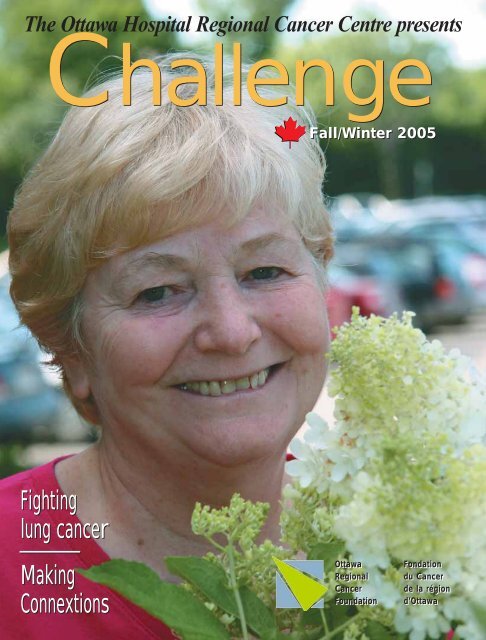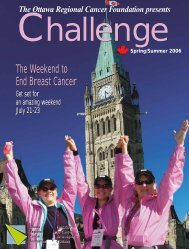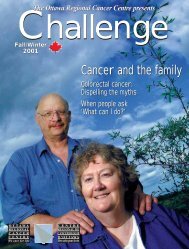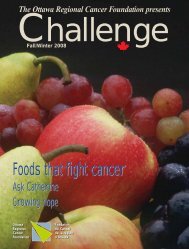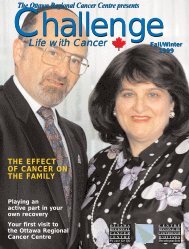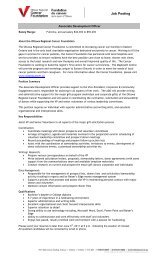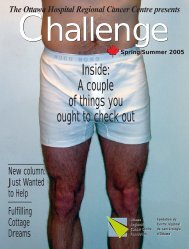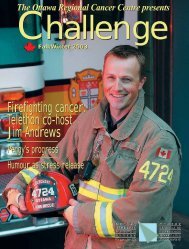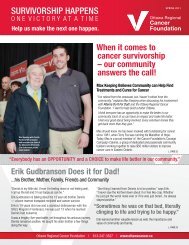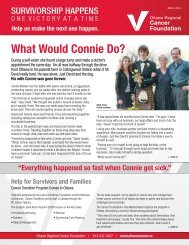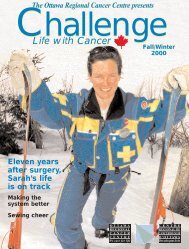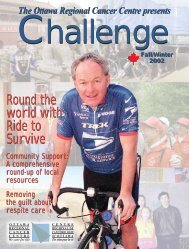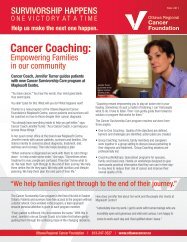Fall Winter 2005 - The Ottawa Regional Cancer Foundation
Fall Winter 2005 - The Ottawa Regional Cancer Foundation
Fall Winter 2005 - The Ottawa Regional Cancer Foundation
Create successful ePaper yourself
Turn your PDF publications into a flip-book with our unique Google optimized e-Paper software.
‘Busting Out’ celebrates successBy Peggy CummingIn June, <strong>2005</strong>, 38 members of<strong>Ottawa</strong>’s ‘Busting Out’ survivordragonboat team were in Vancouverfor the first ever AllBreast <strong>Cancer</strong> Survivor DragonboatFestival.Sixty-two teams traveled from asfar away as Australia, New Zealand,Poland and all over North America.<strong>The</strong> event was planned and organizedby the marvelous women and familiesof Vancouver’s ‘Abreast in a Boat’, tomark the 10th anniversary of theirfounding.It was from their beginning as amedical experiment by Dr. DonMcKenzie, that survivor dragonboatinghas inspired the health and vitalityof so many women across theglobe, and given us so much tocelebrate!‘Busting Out’ competed in fourraces over two days. <strong>The</strong>y placed firstin the ‘B’ consolation final, winningthe gold medal. Considering racetimes for the final races, ‘BustingOut’ had the 14th fastest final race.We indeed had something to celebrate.But the Vancouver festival was notall about racing ... it was about meetingand making international friendsand celebrating good health.<strong>The</strong> highlights of the team’s sur-prises were a dinner cruise in the sundrenchedVancouver Harbour, a partywith 1600 women all sporting pinkfeather boas, and a Saturday NightDragon Fever dinner and dance! Itwas an enthusiastic and energetic celebrationof health, vitality and lifethat we will never forget.Challenge • <strong>Fall</strong>/<strong>Winter</strong> <strong>2005</strong> 9
Excellent collection of lung cancerresources at Ninon BourquePatient Resource LibraryLooking for informationabout lung cancer?<strong>The</strong> Library can help.By Christine PennInformation can help patientsunderstand and participate intheir cancer treatment, but itisn’t always easy to find booksand other reliable resourcesabout lung cancer.<strong>The</strong> Ninon Bourque Patient ResourceLibrary offers an invaluableservice to patients at <strong>The</strong> <strong>Ottawa</strong> Hospital<strong>Regional</strong> <strong>Cancer</strong> Centre in thisregard.<strong>The</strong> library specializes in cancer information,and library staff JoAnnNicol and Maggie Tabalba are alwayssearching for new books and websites. As a result, the library has developedan excellent collection oflung cancer resources which includesvideos, a CD-ROM and web sites, aswell as books. Here is a selection ofbooks:Books for people withlung cancer and their families100 questions & answersabout lung cancerKaren Parles and Joan SchillerJones and Bartlett, 2003(ISBN 0-7637-2056-9)– Ashley Fraser, <strong>Ottawa</strong> CitizenLibrary staff JoAnn Nicol and Maggie Tabalba are always searching fornew books and web sites.Co-written by a lung cancer survivorand a doctor, this book providesstraightforward information for patientsand family members in the formatof questions that a patient mightask, followed by concise replies. Inaddition to information about theCheck it OutSources of information ondealing with cancer in our lives10 Challenge • <strong>Fall</strong>/<strong>Winter</strong> <strong>2005</strong>
treatment of lung cancer, there aretips about coping with emotional aspectsof cancer.For example, the book gives adviceabout dealing with the stigma of havinga “smoker’s disease.” (“People withlung cancer have names, faces and families,and they deserve the same respectafforded other cancer survivors.”)<strong>The</strong>re is advice about communicatingwith healthcare providers andfamily members, including how to tellchildren about lung cancer. <strong>The</strong>re arealso suggestions for family caregiverson how best to support a person withlung cancer and, at the same time,take care of their own needs.Karen Parles has also created awebsite: www.lungcanceronline.orgwhich, in addition to having resourceswritten specifically for patients andtheir families, gives instructions onsearching for information in medicaldatabases, has links to treatmentguidelines and summaries of paperspresented at lung cancer meetings andconferences.<strong>The</strong> following books are also writtenspecifically for lung cancer patientsand their families, and containinformation about both small cell andnon-small cell lung cancer. Topics includeinformation about the lungs,what lung cancer is, treatment options,coping with side effects, etc. (Areview of a personal story of a lungcancer patient – Barb’s miracle: howBarb Tarbox transformed her deadlycancer into a lifesaving crusade –appears on page 22 of Challenge). Allof these books can be borrowed fromthe Ninon Bourque Patient ResourceLibrary.Lung cancer:A guide to diagnosisand treatmentWalter Scott,Addicus Books, 2000(ISBN 1-886039-43-7)Lung cancer:Making sense of diagnosis,treatment and optionsLorraine JohnstonO’Reilly & Associates, 2001 (ISBN1-596-50002-5)Lung cancer:Myths, facts, choicesand hopeClaudia Henschkeand Peggy McCarthyWW Norton & Co, 2002(ISBN 0-393-04154-9)On the InternetTwo of the newer books on lung cancerare available only on the Internet:Understanding lung cancer:A guide for patientsand their families<strong>Cancer</strong> Care Ontario, 2004Available on <strong>Cancer</strong> Care Ontario’sweb site at http://www.cancercare.on.ca/pdf/UnderstandingLung<strong>Cancer</strong>.pdfThis 36-page book gives basic informationabout lung cancer and explainsthe terminology often used indiagnosis and treatment in a questionand answer format. Examples of topicsare : What is lung cancer? Whatare the symptoms of lung cancer?How is lung cancer diagnosed?With every breath:A lung cancer guidebookby Tina M St Johnhttp://www.lungcancerguidebook.org/book.htm.<strong>The</strong> author has given permissionfor people to download their owncopy of this 585-page book or any ofits chapters for their own personaluse. In addition to explaining lungcancer and its treatments, this bookprovides information about livingwith lung cancer, such as nutrition,complementary therapies, copingwith side effects and planning for thefuture.<strong>The</strong> Ninon Bourque Patient ResourceLibrary has the informationyou need.To find out more about lung canceror any cancer-related topic, to borrowbooks or to search for health informationon the internet, please visit theNinon Bourque Patient Resource Library.You can also phone or e-mailfor information:Ninon BourquePatient Resource Library<strong>The</strong> <strong>Ottawa</strong> Hospital<strong>Regional</strong> <strong>Cancer</strong> Centre –General Campus – Main FloorOpen Monday to Friday from8:30 to 12:30 and 1:00 to 3:30Contact 613-737-7700 ext. 70107or consumerhealth@ottawahospital.on.cawww.ottawahospital.on.ca/sc/cancer/library-e.aspIf you have appointments at theCivic Campus, you can borrow andreturn books from the ConsumerHealth Library.Room D100A– Civic Campus 1st FloorContact 613-798-5555 ext 13315or consumerhealth@ottawahospital.on.ca.Challenge • <strong>Fall</strong>/<strong>Winter</strong> <strong>2005</strong> 11
Nuanced affliction makesus demand subtletiesLast year, Rosa Harris-Adler, theEditor of <strong>Ottawa</strong> City magazine,called up Challenge Magazine to offerher services, “gratis.” She just wantedto help if she could.We feel fortunate to have Rosa writinga column about how cancer affectsall of us, whether we, or peoplewe know, are the patients.If you have a question or a topic for“Just wanted to help”, please e-mailRosa at rharrisadler@hotmail.com,and we’ll try to cover it in our nextissue.Millions of NorthAmericans took theloss to heart whenPeter Jennings diedof lung cancer on August7th. <strong>The</strong> newscaster – a thoroughprofessional and a calm, reasonablevoice of authority no matter what thechaos he covered – developed astrong bond and a dynamic relationshipwith his viewers. <strong>The</strong>y trustedhim to walk them through the dramaticand day-to-day stories that shape allour lives. And he did so fearlessly andstraightforwardly, with his trademarknatural grace.Here in <strong>Ottawa</strong>, of course, we tookhis death personally. He was one ofour very own, after all – a native sonwho, through talent, diligence andhard work, made it to the top of hiscraft. We will miss him in our ownspecial way.His death also highlighted the crueland relentless reality of lung cancer.Suddenly news magazines were producingcover stories on the subject,full of information about new testingprocedures and replete with graphsand charts showing the nature of thedisease, its causes and its effects.Lung cancer became high profile –and that’s a good thing. <strong>The</strong> more peoplewho are alerted to its dangers –the more people who consider quittingsmoking as a result of all the attention– the better.All the same, it struck me that ittakes a death such as Jennings’ for themedia to focus attention on a particular<strong>The</strong> death of Peter Jennnings highlighted lung cancer’s relentless reality.JustWantedto HelpRosa Harris-Adlerkind of cancer. You might be forgivenfor thinking that cancer is a singularcondition with no unique properties Ifyou have been lucky enough never tohave been touched by its ravages.Yet whenever I read that someonehas cancer, I’m always left with a fundamentalquestion: which kind? Sayinga person has cancer is like sayinga person is tall or smart. How tall orsmart? Relative to what? Compared towhom? I crave specifics, I think, becauseI lost someone dear to me. Hedied of pancreatic cancer. I can tellyou every detail of the course and natureof the ailment. I’m sure I’m notalone in this. Those of us who haveexperienced cancer – either personallyor through family and friends – knowit’s a nuanced affliction. Those of us“<strong>The</strong> truth is, those ofus affected know ‘our’cancers intimately –and we can findourselves resentingpeople who see usall through the samepair of eyeglasses.”who have been there xxxxxxxxxxxxxxknow how vital itis to have every piece of informationon the subtleties that distinguish onevariety from another. Those of us whohave been there know there are certaincancers that come with more hopethan others.<strong>The</strong> bottom line is this: the termcancer should no longer be used asshorthand for so wide a range ofproblems. <strong>The</strong> word strikes soul-destroyingfear into most people – andContinued on page 1512 Challenge • <strong>Fall</strong>/<strong>Winter</strong> <strong>2005</strong>
<strong>The</strong>y just want to have fun: Under the direction of ‘team builder’ Paddy Stewart,Grimes Lodge patients and their family members exude positive attitude and support.Celebrate life with the healingpower of music and laughterBy Paddy StewartI just have two tons of fun withthe cancer patients who stay over atthe Grimes Lodge while they gettheir treatment.Like the saying goes – A merryheart doeth good like a medicine.(Proverbs 17:22) My evening withthese wonderful people combinesmusic and laughter together withsome team building approaches thatI use in my work.Sure, everyone loosens up when Istart the evening off with a couple ofHank William’s tunes like “HeyGood Lookin” and “Got a Feelin’Called the Blues”. It also helps tobreak the ice with a quick joke likethe one about the butcher whobacked into his meat grinder – he gota little behind in his work! Or whenthe jumper cable walks into a barand the bartender says, “I’ll serveyou, but just don’t start anything.”Before people arrive, I set thesofas and chairs up in the room toform a circle. This brings us closerto share our laughter, comments,and songs. I use a simple activitycalled “Name Game” for us to learneach others’ first names. What betterway to make people feel welcomethan to call each by name forthe evening!You can’t beat laughter and music– it’s an old time barn dance! We allsing “You are My Sunshine” and asmuch as we can remember from requestslike “Beautiful Brown Eyes”,“Blue Suede Shoes” and “WabashCannonball.” I’ve got a bag of crazyhats for people to wear that get peoplein a party mood. I pass outfunny rhythm shakers to add to thehand clapping and foot stomping.<strong>The</strong> Team Competition I call“Name the Tune” gets peoplepumped up and cheering. I dividethe group into two Teams – let’s saythe “Tigers” and the “Bees”. <strong>The</strong>Tigers’ cheer is a roar and of coursethe Bees buzz. <strong>The</strong> challenge is tosee who can first identify a songthat I whistle – a Tiger or a Bee. Ithen whistle one of the top songsfrom 1930-1980 from my booklet.Whoever first identifies a song like“Chatanooga Choo Choo” (1942) or“Tenessee Waltz” (1952) wins apoint for his/her team. <strong>The</strong> teamsget all excited and cheer as theyscore points. It’s such a fun way tofocus on the moment.In August I took a digital pictureof the entire group at the end of theevening. Wearing crazy hats, ofcourse. My wife and I had hardcopies made and dropped them offback at the Lodge next day. What agreat reminder of the joy and camaraderiewe shared!I believe in the healing power ofmusic and laughter. I’ve seen it. Ourjoy and togetherness at Grimes is acelebration of life that has mirrorsthe positive attitude and supportthat are so important in the battlewith cancer.In addition to his singing andlaughing with both seniors and children,Paddy Stewart does a varietyof work as a Wellness Coach. Notonly does he conducts workshops ontopics like Team Building and Humourin the Workplace, he is also amotivational speaker and conferenceentertainer. Paddy can bereached at his website www.paddystewart.com.Challenge • <strong>Fall</strong>/<strong>Winter</strong> <strong>2005</strong> 13
fashion designers,” she says. “DesignerJanine Adamyk is doing a weddingbear, the Stratford Festival <strong>The</strong>atre isdoing a bear. We’ve had a lot of fineartists.”<strong>The</strong>re are embassy dinners andtrips abroad, and art in various forms.Another part of their fundraising,Abigail’s Pink Ribbon Bracelet hasbeen for sale since Mother’s Day. <strong>The</strong>bracelet was designed by RochelleGreenberg and Wakefield artist CasGreenman, who produced it. Saleshave so far netted $18,000 for cancerresearch.<strong>The</strong> bracelet can be purchasedthrough the ORC <strong>Foundation</strong> office,at Vanilla on Elgin Street, at Dilemmeon Bank Street and at Tulip Noir inWakefield. <strong>The</strong> price is $68 – $78with GST – and $40 of the purchaseprice goes directly into cancer research.<strong>The</strong>y will stop producing that designin the new year, and will thenlaunch a brand new bracelet.Artist Bernard Poulin has designedthe new logo. “One of the statementswe make in our marketing material isthat this for our daughters and granddaughters.Bernard took 100 pictureslooking for the right mother and daughtercomposition,” she says. “He chosethat logo for the synergy between themother, daughter and bear. He’s brilliant;a fine artist, and a great guy.”Rochelle Greenberg has sold the attractivebracelets off her wrist – tobank tellers and others who’ve seenthem.This year, as they did in 2003, theEmpire Grill will donate the proceedsfrom sales of Abigail’s Pink RibbonMartini.Ms. Greenberg says Abigail has becomenot only a symbol for breastcancer but also of survival and hope.“You are never too old to have a teddybear.”As for the event, on which they’vebeen working so hard, “it’s alwaysfun; it’s always a sell-out.”For more information, please viewwww.aneveningwithabigail.com.Rosa Harris-AdlerContinued from page 12no wonder. <strong>The</strong> disease is often perceivedas an automatic death sentence.In so many instances, not toolong ago, that was very much thecase. But it does a disservice to all ofus who have had a brush with cancerto classify every form of the ailmentunder the same umbrella.For one thing, it manages to depersonalizeour experience – to make itseem as though each individual’sfight is exactly the same as another’s.<strong>The</strong> truth is, those of us affected know“our” cancers intimately – and we canfind ourselves resenting people whosee us all through the same pair ofeyeglasses. What’s more, times havechanged over the last several decades.In recent years, there have been enormousstrides in treatment on variousfronts in the cancer wars. To group allcancers under the same banner is toignore this. And that’s a problem weshould all address.Obviously, there are no “good” cancersor “bad” cancers. In a generalsense, learning that you or a loved onehas the disease – whatever its form –is a terrifying moment. At the sametime, people with prostate cancer, cervicalcancer, forms of breast cancerand many other types of the diseasestand an excellent chance of survivalthese days. More than survival, actually– they stand to live long andhealthy lives with few lasting consequences.Of course, there are also cancersthat are far more devastating. Yes,lung cancer is among them – althoughthere have been a few encouragingbreakthroughs even on that score. <strong>The</strong>point is, those who haven’t been affectedmay need to refine their thinking,if for no other reason than this: Iffear of the word prevents one singleperson from seeking treatment for aform of cancer that can be brought toheel, the consequences are significant.Early detection is so critical tocare. No one should die because of agenerality.✃Challenge • <strong>Fall</strong>/<strong>Winter</strong> <strong>2005</strong> 15
<strong>The</strong> <strong>Ottawa</strong> RegionaUpcoming Events9th Annual CelebritySports DinnerNovember 16, <strong>2005</strong><strong>The</strong> 8th Annual <strong>Ottawa</strong> CelebritySports Dinner will be held, at the CivicCentre Salons, Lansdowne Park.In the past a guest athlete was seatedat every table. <strong>The</strong> celebrities typicallyinclude past and present Olympicathletes, members or the <strong>Ottawa</strong> Senatorsand 67’s Hockey Clubs, membersof the <strong>Ottawa</strong> Renegades, andthe <strong>Ottawa</strong> Rough Riders alumni.Past dynamic keynote guest speakershave included Ron Maclean, DickIrvin, Rubin “Hurricane” Carter, WalterGretzky, Dennis Hull, and Marv Levy.For more information on how youcan sponsor and participate in theevent please contact Anna Silvermanat 613-798-9818 Ext 225.Cocktails for <strong>Cancer</strong>“Sky’s the Limit”November 17th, <strong>2005</strong>This year’s exciting event will be heldon Thursday, November 17th at theMuseum of Aviation. Cocktails for<strong>Cancer</strong> promises to be an eveningto remember that will feature theglamour and magic prevalent in theskies of the 1930’s and 1940’s.For more information please visitwww.cocktailsforcancer.com.9th Annual <strong>Cancer</strong><strong>Foundation</strong> TelethonJanuary 15th, 2006<strong>The</strong> 9th Annual <strong>Cancer</strong> <strong>Foundation</strong>Telethon will be aired live on theA Channel (cable 6) from St. LaurentCentre on Sunday, January 15th,2006 between 12 p.m. and 7 p.m.For more information on volunteeror sponsorship opportunities pleasecall the <strong>Foundation</strong> at 247-3527.Astral Fitness “BurnCalories for <strong>Cancer</strong>”January 15th, 2006Astral Fitness & Health Club Inc.will host their first calorie-burningmarathon in conjunction with thisyear’s Telethon. This 12-hour communityChallenge will be held atAstral Fitness & Health Club Inc.,44 Iber Rd., Stittsville. For moreinformation contact Astral Fitnessat 831-2348.Quest for a CureCity ChallengeQuest for a Cure – City Challenge, isa fun, fast paced race through theurban wilderness of the NationalCapital Region. Teams entered in theCity Challenge will choose their ownroute to each of the course zones,traveling on foot, public transit andmountain bike.Please visit www.questforacure.cafor more information.An Evening with AbigailPink Carpet Eventand the Abigail bracelethelp the <strong>Foundation</strong>April 27th, 2006Abigail will come out of hibernationin spring 2006 and host anotherdazzling and magical evening featuringa fabulous cocktail reception,unique live and silent auction,indulging packages, spectacular art,celebrity auctioneers and couturierbears of all kinds.<strong>Ottawa</strong>’s new “pink carpet event” willheld at the Government ConferenceCentre, 2 Rideau Street.Once again this delightful eveningwill be hosted and supported byHonourary Co-chairs JacquelinHolzman and Mayor Bob Chiarelli.By doing so you will be helping uscome one step closer to finding acure for breast cancer and allwomen’s cancer.An amazing $40 from each braceletpurchase will be donated to the<strong>Ottawa</strong> <strong>Regional</strong> <strong>Cancer</strong> <strong>Foundation</strong>,in the areas of research and patientadvocacy. <strong>The</strong> Abigail was designedby local jewelry designer Cas Greenman.For more information please visitwww.aneveningwithabigail.com.✃16 Challenge • <strong>Fall</strong>/<strong>Winter</strong> <strong>2005</strong>
l <strong>Cancer</strong> <strong>Foundation</strong>Linda Eagen newExecutive Directorof ORC <strong>Foundation</strong>Linda Eagen, MBA,has been appointed theExecutive Director of<strong>The</strong> <strong>Ottawa</strong> <strong>Regional</strong><strong>Cancer</strong> <strong>Foundation</strong>, thecharity focused on expandingand enhancingcancer services in easternOntario.Ms. Eagen is a capableand proven leaderwith high-level experiencein the not-for-profitsector. She is known forher fundraising expertiseand her skills as amotivator.In the last 20 years she has directed several campaigns anddeveloped a variety of revenue generation programs raisingover $70 million in support of health, education, arts andculture, community and social welfare organizations.John Ouellette joinsthe <strong>Foundation</strong> as Directorof Leadership Gifts<strong>The</strong> <strong>Ottawa</strong> <strong>Regional</strong> <strong>Cancer</strong> <strong>Foundation</strong> is happy to announcethe appointment of John Ouellette as the new Directorof Leadership Gifts.John Ouellette has been a professional fundraiser in theNational Capital Region for almost 15 years and has managedall facets of fundraising including the planning, directing,and implementation of various campaigns.Originally from Kapuskasing in northern Ontario, John isa graduate of the University of <strong>Ottawa</strong>.Beginning his career with United Way/Centraide <strong>Ottawa</strong>in 1991, he earned his Certified Fund Raising Executive(CFRE) designation in 1999.He returned to his alma mater in 1994 as Major Gifts Officerand has since held progressively senior positions, includingthe Campaign Director of the $200 million Campaign forCanada’s University. To date, that initiative has raised morethan $135 million.A Big Brother for eight years and a member of the executivecommittee of the board of Big Brothers of <strong>Ottawa</strong>, Johnis an active presenter at fundraising conferences.He currently sits on the board of the Association ofFundraising Professionals – <strong>Ottawa</strong> Chapter.Amar Aasha fundraiser exceeds expectationsLast April’s successful Amar Aasha“Hope for a Cure” musical fundraiserraised over $31,000 for the <strong>Ottawa</strong><strong>Regional</strong> <strong>Cancer</strong> <strong>Foundation</strong>.Over 650 members of the Indo-Canadian community came togetherfor the popular event.Young and old dressed up, danced,feasted on gourmet food, and sharedtheir culture while learning more aboutcancer from Dr. Shailendra Verma.<strong>The</strong> Amar Aasha “Hope for a Cure”was the brainchild of Sudha Mistry,Prathibha Malavia, and their families.Indu Mehta, Balwant Mistry, KundanBharania, and Kumud Mody were fourother prominent members of the committeebrought in to help organize theevent, and make Amar Aasha a reality.Much of the event’s success was attributedto its primary focus on families;there hadn’t been many events inthe Indo-Canadian community educatingfamilies on cancer and research.Cheque for over $31,000 presented to the ORC <strong>Foundation</strong>.Challenge • <strong>Fall</strong>/<strong>Winter</strong> <strong>2005</strong> 17
Connextions 18-35responds to unique needsof young peopleBy Louise RachlisA 19-year-old woman lookedaround the chemo room.“Everyone’s got gray hair, andthey’re so much older than me,” thecancer patient said. “I don’t feel as ifI belong.”“She asked what support groupswere available and I described them,”says social worker Linda Corsini.“We both realized there were nonejust for young cancer patients, but shewanted to attend a suport group withpeers her own age; that was what shewanted, to be with her own agegroup.”Of the 6,000 new patients everyyear, about 200 of those new patientsare under 35, says Ms. Corsini. “Thatgot me thinking. <strong>The</strong> woman’s familydid a fundraiser and Connextions 18-35 was born.”Young adults with all types of cancercan attend. It’s not a family group;the patients prefer to have the groupjust for themselves, so just the patientsget together.<strong>The</strong> group started meeting twoyears ago, and now several youngmen and women meet monthly toshare common concerns and challenges.“I was at the end of my treatmentand one of the social workers saw meand thought the group might help me,”says group member, Kyla Copp, 31.“Daily, weekly, monthly, there areimportant issues that affect only us,”she says. “It’s one thing to research onthe Internet, but it’s another thing tohave the human contact to discuss it;to have their feelings and ideas aboutdifferent scenarios.”When Kyla joined a year and a halfago, there were just four in the group,“It’s one thing toresearch on theInternet, but it’sanother thingto have thehuman contactto discuss it.”– Kyla Copp,Connextions membershe says. “I became attached to twogirlfriends, one I’m still close withand one which unfortunately passedaway.”An account executive withTranscontinental Media, Kyla was diagnosedwith stage 3 breast cancer atage 28. She is free of cancer now.“<strong>The</strong> most important aspect of thegroup for me is that once a month Ican sit down with them and I don’thave to tell my own story again,” sheKeeping Spirits Upsays. “We can ask them ‘how was itthis month?’ <strong>The</strong>re are so many differentthoughts and activities that aredifferent after we’ve been diagnosed.We all understand each other.”Group member Travis Gobeil hasbeen attending for almost a year. “It’sreally hard to talk to friends,” saysTravis, 24, who had non Hodgkinslymphoma.“<strong>The</strong>re is no one my age who hasbeen through the same thing as me,”says Travis, who works at Momentous.ca,an internet company. “WhenI tell someone I had cancer, they say‘my grandmother had cancer.’ Asyounger patients, we don’t have thesame issues as a lot of older people.”“<strong>The</strong> psychosocial needs of youngpeople are unique,” Ms. Corsini says.“Oftentimes their education is interrupted,or they haven’t had their childrenyet before cancer strikes. Sometimesthere are financial difficultiesbecause they haven’t been workingfor very long. Some have studentloans, and education interruptions arenot uncommon. Friendships, partneringand fertility can also be impacted.Body image is a big deal...<strong>The</strong> commonproblems of all cancer patientsare heightened for this age group.”Parents can become re-involvedsoon after their adult child has lefthome and become over-protective, reversingnewly acquired independence.“After every group session, I becomemore convinced of its need,”she says. This fall, all newly diag-18 Challenge • <strong>Fall</strong>/<strong>Winter</strong> <strong>2005</strong>
“...If I could give advice to any youngperson with cancer, it would be to join agroup sooner than later. If one isn’t organizedin your hometown, talk to a socialworker or nurse, and see if onecould be started. It only takes two tostart! Otherwise, there are many optionsonline for us to voice our opinions orask questions on various forums.”Kyla CoppBreast cancer survivor, 31nosed patients for the past two years will be contactedand invited to attend the group.Linda Corsini is also looking into having acomputer-assisted group where they all get onlineat the same time. This would help those living inoutlying areas to be involved, especially in wintermonths. Almost all young adults in this age rangeare computer literate, she says, so computer-assistedgroup sessions are entirely workable.This past spring, Linda became aware of Realtime<strong>Cancer</strong>, a group based in St. John’s, Newfoundland,supporting young people with cancer.Realtime <strong>Cancer</strong> hosted a cancer retreat foryoung adults living with cancer in September.Delegates came from across Canada, includingeight from Connextions 18-35 group atTOHRCC in <strong>Ottawa</strong>. “We received funding fortravel expenses from the ORC <strong>Foundation</strong>. Allcosts for food and accommodation were paid forby Realtime.”Many of the <strong>Ottawa</strong> group also had their ownfundraisers totalling more than $1,000 and includedsuch events as an end-of-chemo party, abake sale and a school fundraiser which all wentto help repay some of the travel money and toshow their appreciation to the ORC <strong>Foundation</strong>.If you’re interested in attending a Connextions18-35 meeting, they are held the 4th Wednesdayof every month at TOHRCC General Campusfrom 5 p.m. to 6:30 p.m. For further information,please call Linda Corsini at 737-7700 ext. 70142.Travis Gobeil and his friend Suzanne Muise celebrate at aChristmas party last winter, right after his hair grew back.‘Finding peersto relate to’For young cancer patients, a group like Connextions 18-35makes a big difference in keeping up their spirits.“It’s a comforting feeling knowing that we’re not alone, eventhough it might seem like that in the waiting rooms,” says Connextionsmember Travis Gobeil.“It’s important for anyone with cancer to get as much supportas they possibly can, both physical and mental,” he says. “You’regoing to need someone to talk to who knows what it’s like to bein your shoes. Unfortunately, only about three out of every 100new cancer patients are under the age of 35, and that makes finding‘peers’ to relate to that much more difficult.”In addition, he says, “there’s a stigma of ‘I’m young, I don’tneed help’ – which of course once you get a little older you realizethat’s total fallacy. <strong>The</strong>re are younger people like us who havebeen through it, and together we can laugh off the hair loss, thehelplessness and the unique challenges we face as young peoplewith cancer.”Challenge • <strong>Fall</strong>/<strong>Winter</strong> <strong>2005</strong> 19
– Nicki Corrigall, <strong>Ottawa</strong> CitizenChristine Penn, Valerie Fiset, Lorraine Montoya and Eric Simoneau make up theLung <strong>Cancer</strong> Clinical Pathways Initiative Team.Lung cancer clinical pathways:Enhancing quality of carefor patients and their familiesEarlier this year, <strong>The</strong> <strong>Ottawa</strong>Hospital <strong>Regional</strong> <strong>Cancer</strong>Centre received fundingfrom <strong>Cancer</strong> Care Ontario’sAccess to <strong>Cancer</strong>Services Innovation Fund to developclinical pathways for patients andfamilies affected by lung cancer.<strong>The</strong> lung cancer clinical pathwaysproject will improve the quality of carefor lung cancer patients and their familiesby ensuring that there is continuityof care from diagnosis to treatmentand, if necessary, to palliative care services.Patients and their families willalso be able to obtain support andcounseling services, and will be providedwith the information they needto understand their treatment plan andbe more involved in their care.Valerie Fiset, Advanced PracticeNurse for Lung <strong>Cancer</strong>, leads the project.<strong>The</strong> other members of the team includeLorraine Montoya, who is theproject co-coordinator, and ChrisPenn and Eric Simoneau provide researchand administrative support.With input from healthcare professionals,patients and members ofcommunity organizations from <strong>Ottawa</strong>and Eastern Ontario, the team isdeveloping, implementing and evaluatingclinical pathways for lung cancerpatients and their families. <strong>The</strong>pathways focus on the care of patientswho are being diagnosed with lungcancer and those living with advanceddisease.What are clinical pathways?Clinical pathways aim to have “theright people doing the right things inthe right order at the right time in theright place with the right outcome, allwith attention to the patient experience.”*Clinical pathways are used inmany healthcare settings and areplans of care that outline the essentialsteps in the care and treatment of patientswith a specific clinical problem,and describe the expectedprogress of the patient.<strong>The</strong>y are patient-focused in thatthey view the delivery of care in20 Challenge • <strong>Fall</strong>/<strong>Winter</strong> <strong>2005</strong>
terms of the patient’s entire treatmentexperience. <strong>The</strong> emphasis is on providingthe most appropriate care forthe patient based on the best clinicalevidence.Clinical pathways promote continuityof care, and represent a detailed,step-by-step outline of the patient’streatment plan that is used by all themembers of the healthcare team. Inturn, use of the pathway may reducewaiting times and avoid duplication oftests and procedures. Patients receivea copy of the pathway, so they are betterable to understand the treatmentprocess and know what to expect.<strong>The</strong> Lung <strong>Cancer</strong> ClinicalPathways Initiative<strong>The</strong> Lung <strong>Cancer</strong> Assessment Pathwaywill provide continuity of careand streamlined access to diagnostictests from the time that a patient issuspected of having cancer through tosurgery or other treatments that maybe required. Patients will receive theinformation they need to understandtheir care, and, if necessary, they willbe able to obtain counseling to helpthem cope emotionally and with practicalconcerns such as finances. It ishoped that implementation of thepathway will help decrease wait timesfor lung cancer treatment.<strong>The</strong> Advanced Disease Pathwaywill ensure that patients who have advancedlung cancer receive the careand treatment they need to relieveMany patients whoare newly diagnosedwith lung cancerare initially in shockand do not knowwhat questions to ask,or what informationis needed.physical symptoms, and that emotional,spiritual and practical support isavailable. <strong>The</strong> pathway will improvethe coordination of care that the patientreceives at home, at the <strong>Cancer</strong>Clinic, in the hospital and from organizationswithin the community.Some of the activities that havetaken place as part of the developmentof the lung cancer clinical pathwaysare:Literature Review<strong>The</strong> project team has undertaken anextensive review of health care literatureon lung cancer and supportivecare to determine the best clinicalpractice to incorporate into the pathwayto ensure that the pathways arebased on the best evidence.Focus GroupsProject team members have heldfocus groups with patients and healthcareproviders at <strong>The</strong> <strong>Ottawa</strong> Hospital<strong>Regional</strong> <strong>Cancer</strong> Centre, and at hospitalsin Cornwall, Renfrew and Winchester.<strong>The</strong> purpose of the focus groupsis to identify strengths and weaknessesin the present system for the care oflung cancer patients by talking to thepeople who have direct experience inthe system, and asking for their suggestionsand solutions.Working Groups<strong>The</strong> project team has establishedtwo working groups, one to provideinput and feedback for the assessmentpathway and one for the advanced cancerpathway. <strong>The</strong> groups are made upof a variety of representatives from thehealth care team at the <strong>Ottawa</strong> Hospital.Community organizations and patientsare also involved. Members ofthe working groups meet to contributeto the development, implementationand evaluation of the pathways.<strong>The</strong> Lung <strong>Cancer</strong>Information Guideand Personal RecordOne very important part of theLung <strong>Cancer</strong> Clinical Pathway Initiativeis the development of a PatientInformation Guide and PersonalRecord. Many patients who are newlydiagnosed with lung cancer are initiallyin shock and do not know whatquestions to ask, or what informationis needed. Lung cancer is often accompaniedby symptoms such asContinued on page 23Learning About and Livingwith Lung <strong>Cancer</strong>A Special Patient Education ForumWhen:Tuesday, November 22nd <strong>2005</strong>Time:6:30 p.m. to 9:00 p.m.Where:Capone’s Restaurant,831 Industrial Avenue, <strong>Ottawa</strong>Lung cancer patients and their familiesare invited to a discussion about livingwith lung cancer and its treatment.Refreshments will be served.<strong>The</strong> forum is free, but registration is required.For more information or to register,contact Eric at 798-5555 ext. 10477.Challenge • <strong>Fall</strong>/<strong>Winter</strong> <strong>2005</strong> 21
Lung cancer research:Progress at the benchand at the bedsideBy Douglas GrayLung cancer can be a verydisheartening diseasearound which to base one’sresearch. Dishearteningbecause of the cruel statistics(22,200 new Canadian cases expectedin <strong>2005</strong> and 19,000 deaths,meaning that lung cancer will onceagain top the charts in terms of bothincidence and mortality). Dishearteningin our inability to modify humanbehavior – I recall a dinner party atwhich I was asked what sort of researchI do, and in response to ‘lungcancer’ the questioner leaned forwardthrough his thick cloud of cigarettesmoke and asked without a trace ofirony “come up with anything yet?”.Well yes, we have learned a thing ortwo about causation, but the questionerwould have read about that on thepackage. Disheartening in terms ofour scant knowledge of the very originof lung cancer cells, or what to doabout them when they arise. Here, Iam happy to report, genuine progresshas been made. <strong>The</strong> past few weekshave seen the publication of two importantpapers in lung cancer research,one basic and one clinical innature. What follows is a summary oftheir findings.<strong>The</strong> first paper is from the laboratoryof Tyler Jacks at the MassachusettsInstitute of Technology,and addresses a longstanding mysteryregarding the existence and identityof stem cells in the mammalian lung.Stem cells have been discussed bylocal experts in the pages of previousissues of Challenge, but to reiteratethey are very special cells, rare innumber, and with two defining properties.<strong>The</strong> first is that they can developinto more than one cell type withinthe body. <strong>The</strong>re are stem cells in thebone marrow, for example, that candevelop either along the lineage thatleads to the oxygen-transporting redOn the FrontierWhere pioneers forge new pathsin the battle against cancerAt last we know fromwhich cell a lungtumour arises, andwe can begin to findways to keep itsproliferation withinappropriate bounds.blood cells or along the lineage thatleads to the white blood cells that provideimmunity to infection. <strong>The</strong> secondproperty is self-renewal. When astem cell divides it can produce onecell that will proceed to develop thespecialized characteristics associatedwith blood or brain or whatever andone cell identical to the parent (inother words a replacement stem cell).<strong>The</strong> property of self-renewal preventsthe depletion of the body’s reserve ofthese precious cells as they are neededto produce new blood, fight infection,repair damage, and so forth.Most cells in the body lack this property;a cell that has committed itselfto the formation of heart muscle, forexample, will die without heirs. Scientistsdescribe such cells as ‘terminallydifferentiated’. <strong>Cancer</strong> biologistshave long recognized that terminallydifferentiated cells are safecells; because they have relinquishedthe potential to divide they pose norisk for becoming transformed intotumour cells.<strong>The</strong> lung is largely comprised ofcells that make up the airways andcells through which gas exchangetakes place. <strong>The</strong>se are terminally differentiatedcells, and as such are unlikelyto serve as the source of lungcancers. It has long been suspectedthat there are stem cells within thelung that are the true source of thenormal cells that in a regulated fashioncan replace damaged tissue, or inan unconstrained fashion can proliferateto form lung cancers. But whereare we to find these cells, and howwill we recognize them in their natu-xxxxxxxxxxxxxxral habitat? It seems the researchgroup of Dr. Jacks has done just this.<strong>The</strong> cell population identified bythe Jacks lab has been designatedBASCs (bronchioalveolar stem cells).<strong>The</strong>y reside precisely where theymight be expected to serve the purposeof replenishing both the cellslining the airways and the cells attheir termini, at the junction of thebronchioles (air passages) and alveoli(the hollow chambers at the ends ofthe airways). BASCs are identifiablein lung tissue because they producethe proteins characteristic of both celltypes. <strong>The</strong>y are rather like confusedapprentices that cannot judge whetherthe housing industry will require carpentersor plumbers, so they carry ahammer in one hand and a wrench inthe other; until they commit to a tradeand release one tool they cannot adequatelyuse the other.Having identified this rare andstrange cell type the researchers dotwo important things. First off theyshow that the apprentice will heed thecall of tissue damage, and commithimself to repairing it. Lungs damagedwith napthalene (the odorouscomponent of mothballs) regeneratetheir epithelium through the divisionof BASCs and the subsequent commitmentof daughter cells to the requiredepithelial cell fate. Second,using cancer-prone transgenic micethey provide evidence that the stem24 Challenge • <strong>Fall</strong>/<strong>Winter</strong> <strong>2005</strong>
cells are in fact the target cells thatgive rise to lung cancers. It is difficultto overstate the significance of thiswork. At last we know from whichcell a lung tumour arises, and we canbegin to find ways to keep its proliferationwithin appropriate bounds.At the same time as our understandingof the basic biology of thelung was being advanced there wasgood news from the clinical front inthe form of a paper in <strong>The</strong> New EnglandJournal of Medicine. Winstonand coworkers reported that followingsurgical removal of tumours the combinationof two drugs (vinorelbineand cisplatin) improved the five-yearsurvival rate of lung cancer patientsby an astonishing 15 per cent over patientswho had only the surgery (69versus 54 per cent). <strong>The</strong>re has beencontroversy over the effectiveness ofadjuvant therapy in non-small celllung cancer (adjuvant therapy refersto the use of chemotherapy drugs as asecondary measure following surgicalresection), but this study providesstrong evident of the benefit of thisdrug combination, and it must be saidthat survival differences of this magnitudeare rarely reported for establisheddrugs used in novel ways.<strong>The</strong>re is more work to do in optimizingthe vinorelbine/cisplatin adjuvanttherapy, but it is indeed encouragingto think that better survival of lungcancer patients will be possible evenin the absence of new breakthroughdrugs.As the finishing touches were beingadded to this article the sad newsemerged of the death of ABC newsanchor Peter Jennings. Mr. Jenningshad access to the very best that modernmedicine could offer for the treatmentof his lung cancer and accordingto the news reports his physicianspursued an aggressive strategy tothwart the disease. In spite of all thisMr. Jennings succumbed within a fewmonths of the initial diagnosis. Clearlythere is much work yet to do.Publications mentioned in the text:Kim., C.F., Jackson, E.L., Woolfenden,A.E., Lawrence, I.B., Vogel,S., Crowley, D., Bronson, R.T., andJacks, T.(<strong>2005</strong>) Identification of bronchoalveolarstem cells in normal lungand lung cancer. Cell 121, 823-835.Winton, T., et al. (<strong>2005</strong>) Vinorelbineplus cisplatin vs. observation in resectednon-small-cell lung cancer.N Engl J Med. 352, 2589-2597.Douglas A. Gray, PhD. isSenior Scientist, Centre for<strong>Cancer</strong> <strong>The</strong>rapeutics at<strong>The</strong> <strong>Ottawa</strong> Hospital<strong>Regional</strong> <strong>Cancer</strong> Centre.Challenge • <strong>Fall</strong>/<strong>Winter</strong> <strong>2005</strong> 25
Hope remains strongin lung cancer patientsAHelpingHandSupport when it’s neededBy Liane Murphy“People with lungcancer have moreemotional distressthan people withdifferent types ofcancer.”– Linda Sarna,Psychiatrist– Kier Gilmore, <strong>Ottawa</strong> CitizenOncology nurses left to right, back row, Cathy Comerford, Suzanne Joly,Carole Filion-Brulotte and Gail Prevost; centre front, social worker Liane Murphy.Iam a social worker and memberof the lung cancer healthcareteam at <strong>The</strong> <strong>Ottawa</strong> Hospital<strong>Regional</strong> <strong>Cancer</strong> Centre(TOHRCC). I have worked formany years with patients who havebeen diagnosed with lung cancer andtheir loved ones.A diagnosis of lung cancer leavesmost people feeling shocked and anxious.“People with lung cancer havemore emotional distress than peoplewith different types of cancer,” sayspsychiatrist Linda Sarna.In addition, according to anotherpsychiatrist, Jimmie C. Holland, thespouse/significant other may alsoexperience “as many symptoms ofdistress as does the patient.”<strong>The</strong>refore it is important for lungcancer patients and their loved ones tohave access to professional counselingservices.Typically people need to talk aboutthe challenges of their diagnosis andtreatment. Sometimes patients arehesitant to bring up issues with theirfamily and prefer to think out loudwith a counselor first.“Most patients are reluctant to discusstheir fears with their families,”says Dr. Holland. “An outside sourceof psychological support is helpfulinitially to permit expression of theconcerns about the future without upsettingother family members.”We tend to want to protect the oneswe love, and often people have difficultytalking about their worst fearswith those they love the most, for fearof upsetting them. In counseling sessions,I encourage patients to thinkabout what is best for their own selfcareas well as developing a meaningfuldialogue with their loved one onwhat is most important and meaningfulto them.26 Challenge • <strong>Fall</strong>/<strong>Winter</strong> <strong>2005</strong>
“Most patients arereluctant to discusstheir fears withtheir families.”– Jimmie C. Holland,PsychiatristThis can only enhance the qualityof life for both patient and their lovedones through treatment and follow up.Social workers connect patientswith resources within and outside of<strong>The</strong> <strong>Ottawa</strong> Hospital <strong>Regional</strong> <strong>Cancer</strong>Centre. Navigating the system can bea challenge, especially when peopleare feeling overwhelmed and unwell.A lung cancer diagnosis createsmany questions and concerns aboutthe support system that each individualneeds. This may be related to theprocess of applying for a disabilitypension to ensure that a patient hasthe financial resources to pay rent andbuy food or how drug costs will becovered.I want to share with you Bill’s story,as it demonstrates how he was able toput the necessary supports in place toensure he was able to complete hisrecommended medical treatment andalso develop a long-term plan for hisown health care.Bill’s story:I met Bill in February of this year.While his medical and radiation oncologistshad recommended that hehave concurrent chemotherapy andradiation treatments, Bill was unsurewhether he should take chemotherapy.Part of Bill’s struggle was that hehad no support and he would be attendingmost of his treatment alone.He was not sure how he would manage.Various necessary supports wereNavigating thesystem can be achallenge, especiallywhen people arefeeling overwhelmedand unwell.explored, and fortunately Bill wasable to move into appropriate housingprior to his treatment.When Bill was settled in his newhome, we focused our time on addressingfinancial difficulties and theoften-complicated process of applyingfor a disability pension.Ongoing support was provided toBill through his treatments. With supportsystems in place, Bill was able togain weight, to increase his energylevel, and in turn his pain decreasedsignificantly.His quality of life had improveddramatically.During treatment, Bill was verybusy with daily treatments and frequentmedical appointments. It wasalmost a full-time job.As with many patients, Bill struggledwith the end of treatment, andthe question that many patients have –“Now what?”A lung cancerdiagnosis createsmany questions andconcerns about thesupport system thateach individual needs.Bill had to find a different way ofspending his time that was rewardingand that supported good health.He participated in the TOHRCCRehabilitation Program, as this bestsuited his needs. Since then, Bill hastaken up running and is in training torun in the <strong>Ottawa</strong> Race Weekend nextspring. Way to go Bill!I would like to remind people thatthere are a variety of resources availableto them such as: TOHRCC SupportGroups and other groups in thecommunity (see listing in this magazine),the Trillium Drug Program, theHospice at Maycourt Program, Unefleur à la main, Friends of Hospice<strong>Ottawa</strong>, Power of Attorney Kits, andmore.Another excellent resource is Lung<strong>Cancer</strong> Canada. <strong>The</strong>y have a programcalled “Lung <strong>Cancer</strong> Connection”,through which individuals have accessto Tele-Support and Tele-Conferenceinformation sessions.As with manypatients, Bill struggledwith the end oftreatment, and thequestion that manypatients have –“Now what?”For more information, the numberto call is 1-888-445-4403 or visit theirwebsite at www.lungcancercanada.ca.In addition, TOHRCC is planningan education session for lung cancerpatients and their loved ones.Learning About and Living withLung <strong>Cancer</strong>: A Special Patient EducationForum for Lung <strong>Cancer</strong> will beheld on November 22nd, <strong>2005</strong>. (Seedetails on page 21.)To help them in their adjustment totheir diagnosis and treatment of cancer,social workers at TOHRCC areavailable to all patients and familymembers.For those who are unsure to whomto speak, please call extension 70516to be referred to the appropriate socialworker.While nurses and physicians oftenrecommend that a patient speak to acounselor, and this is how most patientsare referred to a social worker,patients and family members can alsocall directly and a social worker willbe happy to meet with them.Individuals with lung cancer and/ortheir loved ones can call me directlyat 737-7700 ext. 70147.Liane Murphy, MSW, RSW, is anoncology social worker at <strong>The</strong> <strong>Ottawa</strong>Hospital <strong>Regional</strong> <strong>Cancer</strong> Centre.Challenge • <strong>Fall</strong>/<strong>Winter</strong> <strong>2005</strong> 27
Welcome to la dolce vita:Courage Cruise I sails January 22nd, 2006With flights from <strong>Ottawa</strong>, it couldn’tbe easier.It’s a cruise of a lifetime, and a portionof each booking will be directedto support the expansion of <strong>The</strong><strong>Ottawa</strong> Hospital <strong>Regional</strong> <strong>Cancer</strong>Centre.Gracious style with a Continentalflair awaits you aboard the breathtakinglybeautiful Costa Mediterranea.You’ll be surrounded by all thingsItalian as you explore the wonders ofthe Old World. Relax in the DionisioLounge, where fine Italian wines andsumptuous décor create a delightfulhideaway.Discover the beauty of Venice at thePiazza Casanova and enjoy spectacularentertainment in the luxuriousOsiris <strong>The</strong>atre.From conga lines to Italian cookingclasses, the adventures onboard areendless. <strong>The</strong> finest designers and architectsspared neither effort nor expensein creating the Costa Mediterranea,a ship inspired by the 17th &18th century noble Italian palazzos ofVenice, Lake Como, Sicily, Siena andthe Langhe wine region.A special “Courage I Cocktail Reception,”will kick off your adventure.Here’s the Western Caribbeanitinerary: Sunday, Ft. Lauderdale;Monday, Key West, Florida; Tuesday,Cozumel, Mexico; Wednesday, at sea;Thursday, Ocho Rios, Jamaica; Friday,Grand Cayman; Saturday, at sea,and Sunday Ft. Lauderdale.All prices are per-person based ondouble occupancy and include air,transfers, cruise and taxes. Items of apersonal nature, gratuities, and insurancesare additional. Subject tochange, the accommodations andpricing are Inside, $1,400; Outside$1,550, and Balcony, $1,700.For information and reservations,please contact Marlin Travel inWal-Mart at 2210 Bank Street at521-8687, or Marlin Travel in Wal-Mart, 500 Earl Grey Drive, Kanata, at592-2215.Boundless amenities and an opportunity to support the <strong>Cancer</strong> Centre.28 Challenge • <strong>Fall</strong>/<strong>Winter</strong> <strong>2005</strong>
Support Groups and<strong>Cancer</strong> Information Servicesserving Eastern Ontario“I am not sure how this group works but I know it does.If someone comes in with a particular worry we areable to help them. I know this group has helped mewhen I’ve been worried. It feels comfortable here.”– Support Group ParticipantIt is well documented that peopleliving with cancer benefit enormouslyfrom speaking to others in thesame situation.<strong>The</strong> support groups listed have allbeen developed to offer patients andtheir families support and information.One of the major benefits is thatjoining a group lessens the isolationand anxiety of dealing with cancer.Many of the groups raise awarenessand fundraise for research and services.This is another way of gainingcontrol and finding hope.• Purpose: Dedicated to improving diagnosis,treatment and quality of life to people withVON Hippel-Lindau Disease (VHL)• Toll free US Hot Line Support at 1-800-676-4VHL• Contact: Tania Durand @ (613) 622-7976(during office hours) or email @ tania@igs.net<strong>Cancer</strong>Connection (Canadian<strong>Cancer</strong> Society Program)• Purpose: A toll-free telephone support servicethat matches people with cancer andcaregivers with trained volunteers who havehad a similar experiences.• Support is usually provided within 48 hours• Contact: 1-800-263-6750Canadian <strong>Cancer</strong> Society –<strong>Cancer</strong> Information Service• Purpose: A nationally bilingual toll-free serviceoffering comprehensive informationabout cancer and the community resourcesavailable to cancer patents, their families, thegeneral public and health care professionals.• Provides information about all types of cancer,from prevention and diagnosis to treatmentand supportive care.• Hours: 9 a.m. - 6 p.m. • Contact: 1-888-939-3333• NOTE: SERVICES ONLY AVAILABLE IN CANADA.Candlelighters Childhood<strong>Cancer</strong> Trust• Candlelighters is a not-for-profit, volunteerorganization. Mission: To enhance the livesof children with cancer and their familiesand to promote awareness, understandingand education of this devastating illness.• Provides young people, and their families, a varietyof services through three separate programs:support; education; and public awareness.• Contact: Jocelyn Lamont, Executive Director,@ (613) 715-9157Colorectal <strong>Cancer</strong> Association ofCanada – <strong>Ottawa</strong> Support Group• Purpose: To provide support and informationto those living with colorectal cancer, theirfamilies, friends & caregivers.• Meets 2nd Tuesday of each month, 7-9 p.m.• Viewing Room, 2nd Floor, <strong>The</strong> Palisades,480 Metcalfe Street, <strong>Ottawa</strong>.• Contact: (613) 839-2075, or the Colorectal<strong>Cancer</strong> Association of Canada at 1-888-318-9442 (e-mail: info@ccac-accc.ca) (website:www.ccac-accc.ca)Courage Canada – <strong>Ottawa</strong> Branch• Purpose: A self-help group offered to peoplewith post-radiation treatment.• Contact: Anne @ (613) 737-7882Dundas County Hospice• Purpose: To provides support to anyone witha life-threatening or terminal illness andtheir family/caregivers• Bereavement support• Library material for loan• 4324 Villa Drive, Williamsburg, ON• Contact: Reina DeJong @ (613) 535-2215About Face• Purpose: To offer support to people withAfacial differences.• No regularly scheduled meetings.Helping• Contact: Anne Charbonneau @ (613) 837-7154HandArnprior & District Breast<strong>Cancer</strong> Support GroupSupport when it’s needed• Purpose: To provide support and encouragementto breast cancer patients in the Arnpriorand surrounding area.Breast <strong>Cancer</strong> Action (BCA)• Meet every third Tuesday of the month, 7-9 p.m. • Purpose: To inform, educate and support• Arnprior and District Hospital, John Street,women and men living with breast cancer,Arnpriortheir families, and the community. Provides• Contact: Elta Watt @ (613) 623-7455one-on-one peer support.Barry’s Bay <strong>Cancer</strong> Support Group • Support and Resource Centre, 739A RidgewoodAve., Riverside Mall, <strong>Ottawa</strong>• Purpose: A support group offered to patients, • 10 a.m. to 3 p.m. - 5 days a week.families, caregivers and survivors of the• Contact: (613) 736-5921<strong>Ottawa</strong> Region• Monthly group meetings, individual support Brockville Breast <strong>Cancer</strong>and counsellingSupport Group• Contact: Norma or Ralph @ 613-756-2759 • Purpose: To provide support to women, whoBereaved Families of Ontario,are newly diagnosed with breast cancer.<strong>Ottawa</strong>-Region• Meets the second Thursday of the month, 7-9 p.m.• Trinity Anglican Church, George Street (red• Purpose: To provide mutual aid/self-help followingthe death of a loved one. Also provides • Contact: Carole @ (613) 923-5017, or email @door), Brockvilleeducation in anticipatory grief situations.pictons@ripnet.com Other contacts are Wendy• Meets the first Tuesday of each month, 7-9 p.m. @ (613) 342-5078 or Renee @ (613) 923-5865• St. Timothy’s Presbyterian Church, 2400 AltaVista Drive (downstairs hall)<strong>The</strong> Canadian Thyroid <strong>Cancer</strong>• Contact: Hilda @ (613) 567-4278Support Group (Thry’vors)Bereaved Families of Ontario,• Purpose: A small informal group providingCornwall & Areaonline support, friendship and guidance tothyroid cancer survivors through email• Purpose: To provide support, informationcontact, with occasional meetings.and education to families following a death • Provides information, including referral toand/or terminal illness of a loved one.outside sources, in dealing with diagnosis,• Bereavement support, groups, telephone help treatment and management of thyroid cancer.line, library• Contact: Diane Dodd @ (613) 836-3996 or• Children/Youth programs also available416-487-8267, (diane.dodd@pc.gc.ca) (website:http://www.thryvors.org) On-line sup-• Bereavement Support and Resource Centre• 144 Pitt Street, Cornwall, Ontarioport: http://groups.yahoo.com/group/thryvors• 9-4 p.m. (5 days a week)• Contact: (613) 936-1455, or email at bfcornwall@on.aibn.comURL: www.home.coge-<strong>Ottawa</strong> Area BranchCanadian VHL Family Alliance –co.ca Continued on page 30Challenge • <strong>Fall</strong>/<strong>Winter</strong> <strong>2005</strong> 29
Continued from page 29(<strong>The</strong>) Hospice at May CourtCaregiver Support Group• Purpose: Provides a relaxing environment toindividuals caring for a loved one who hasbeen diagnosed with a life threatening illness.Provides an opportunity to share experienceswith other caregivers in a discussiongroup or one-on-one.• Individual support offered by staff and volunteers• Reiki, foot massage, art and resource centreavailable.• Monthly information sessions presented onspecific topics.• Meet every Wednesday evening at the Hospice(114 Cameron Ave.) from 7-9 p.m.• Contact: Anne @ (613) 260-2906 (Pleasecall to confirm)• NOTE: A PROGRAM GEARED TOWARDSCHILDREN AND YOUTH IS ALSO AVAILABLE.Living with <strong>Cancer</strong> SupportGroup of Brockville• Purpose: A self-help group for people livingwith cancer, their families and friends.• Meets the first Tuesday of the month, 7-9 p.m.• Bridlewood Manor, 1026 Bridlewood Drive,Brockville• Contact: Canadian <strong>Cancer</strong> Society (UnitOffice in Perth) @ 1-800-367-2913, or BettyGilbert @ 613-342-7609Living with <strong>Cancer</strong> SupportGroup of Eganville• Purpose: A self-help group for people livingwith cancer, their families and friends.• Meets the second Wednesday of the month, 7 p.m.• Action Centre, 68 Queen Street, Eganville(near Pembroke)• Contact: <strong>The</strong> Renfrew County Unit of theCanadian <strong>Cancer</strong> Society @ 1-800-255-8873, or you may contact Marcia @ 613-625-1268 or Helen @ 613-628-3236.Living with <strong>Cancer</strong> Support Group ofMississippi Mills and Carleton Place• Purpose: Participants in this group will besupported and encouraged to work throughissues while living with cancer. Sessions willinclude topics of interest geared to the participants,videos, guest speakers, etc.• Refreshments provided• Meets the fourth Tuesday of the month, 7:15p.m. – 8:30 p.m.• Almonte United Church Parlor, 106 ElginStreet, Almonte• Contact: Canadian <strong>Cancer</strong> Society (Unit Officein Lanark, Leeds and Grenville) 1-800-367-2913or 267-1058, or e:mail @ lanarklg@ccsont.orgLook Good ... Feel Better Program• Purpose: A support group for women takingcancer treatment and wanting to know moreabout facial skin care, makeovers and optionsfor hair loss. Free workshop Contact:(613) 737-7700, ext. 6455• PRE-REGISTRATION IS REQUIREDGeneral Division• Every second Tuesday of each month, 2-4 p.m.• <strong>Ottawa</strong> <strong>Regional</strong> <strong>Cancer</strong> Centre, 503 Smyth RoadCivic Division• Every fourth Tuesday of each month, 2-4 p.m.• Maurice Grimes Lodge, 3rd. Floor, <strong>Ottawa</strong><strong>Regional</strong> <strong>Cancer</strong> Centre, 200 Melrose Avenue.Lymphoma Support Group (LSG)• Purpose: A support group for lymphoma patients,their families and friends.• Share your experiences and learn from others• Meets the first Tuesday of each month• Contact: 224-8509 or 232-7795.Marianhill Palliative Care Unit• Purpose: This support group offers a continuityof accessible care with a holistic approachwhich addresses both the spiritual and themedical needs of people with terminal illness.• Three private meeting rooms for confidentiality• Offers a home-like atmosphere• 600 Cecilia Street, Pembroke, ON• Contact: Cathy Brennan-Hogaboam @ 613-735-6838 , ext. 316, or you may email Cathy@ cathybh@marianhill.ca Website:www.marianhill.caMultiple Myeloma Support Group• Purpose: A support group for lymphomapatients, their families and friends.• Share your experiences and learn from others• Meets the fourth Tuesday of each month(excluding December), 4 - 6 p.m.• <strong>The</strong> Hospice at MayCourt, 114 CameronStreet, <strong>Ottawa</strong>, ON• Contact: Teresa @ 737-0648 or Carol @842-9077Nu-Voice Club of <strong>Ottawa</strong>• Purpose: To meet with fellow laryngectomypatients to discuss issues of concern andshare information.• Meets the fourth Wednesday of each month,2-3:30 p.m.• <strong>The</strong> <strong>Ottawa</strong> Hospital, Civic Campus, MauriceGrimes Lodge, 200 Melrose Avenue, 4thFloor, <strong>Ottawa</strong>• Contact: (613) 798-5555, ext. 13416, or byemail at pmaser@ottawahospital.on.caGynaecologic-Oncology Program- “Time for Ourselves”• Purpose: A support group that encouragesthe participant to share his/hers concerns andfeelings with others.• Meets every Thursday, 10:30-12 noon• 8th Floor Lounge (Rm 8230), West Lounge,<strong>Ottawa</strong> Hospital, General Campus• Contact: Hilary Graham @ (613) 737-8899,ext. 72128• PLEASE CALL TO REGISTER<strong>Ottawa</strong> Hospital – LibraryServices – <strong>Regional</strong> <strong>Cancer</strong>Program – Beattie Library• Purpose: Although primarily intended for<strong>Cancer</strong> Centre staff, the Beattie Library isopen to patients, healthcare workers in thecommunity, or to anyone who is researchingcancer information.• Beattie Library, 503 Smyth Road, <strong>Ottawa</strong>• Monday to Friday, 8:30 a.m. - 12 noon/1 - 4:30 p.m.• Contact: (613) 737-7700, ext. 6984<strong>Ottawa</strong> Hospital – LibraryServices – <strong>Regional</strong> <strong>Cancer</strong>Program Ninon Bourque PatientResource Library• Purpose: To provide up-to-date cancer informationto cancer patients and their families,and members of the general public.• Main Level, 503 Smyth Road, <strong>Ottawa</strong>• Monday - Friday, 9:30 a.m. - 3 p.m.• Contact: (613) 737-7700, ext. 6980<strong>Ottawa</strong> Hospital <strong>Regional</strong> <strong>Cancer</strong> CentreSocial Work Support Groups• Purpose: To provide ongoing support groupsoffered by TOHRCC Social Workers:1. Adult Brain Tumour Support Group(a support group for people with braintumours, and their family/friends)• Meets the first Tuesday of each month, 7-9 p.m.• <strong>Ottawa</strong> Citizen Building, 1101 Baxter Road• Contact: Diane Ford (613) 737-7700 ext.6685; Kathleen Greene (613) 820-4289;Linda Durocher 737-8899, ext. 78053.2. CHEO to TOHRCC Bridge Program(a monthly orientation workshop foryoung adult survivors of childhood cancer,who are in transition from their paediatricteam to their new adult program)• This program offers a chance to meetTOHRCC staff, understand long-termeffects of cancer treatments, and meetother young adult survivors.• Family members welcome.• Meets first Friday of each month• 12 noon to 1 p.m.• Supportive Care conference room, Firstfloor (behind Module A), General Division,TOHRCC, 503 Smyth Road, <strong>Ottawa</strong>• Contact: Linda Corsini @ (613) 737-7700, ext. 6856.3. Coping with <strong>Cancer</strong> Stress(a 4-week classroom style course formen and women with cancer, and theirloved ones)• This course is of particular interest tothose patients who are newly diagnosed.• Learn methods of coping with the emotionalaspect of cancer as well as stressmanagement techniques.• Contact: Diane Manii @ (613) 737-7700, ext. 6852.4. Connextions 18-35(a monthly support group for cancer patientsage 18 to 35 years of age, whocope with special problems regardingrelationships, self image, education, careerand lifestyle changes)• This support group offers an opportunityto meet others, discuss/share experiencesand explore coping strategies forself and family.• This course is of particular interest tothose who are newly diagnosed.• Learn methods of coping with the emotionalaspect of cancer as well as stressmanagement techniques.• Contact: Diane Manii @ (613) 737-7700, ext. 6852• REQUIRES PRE-REGISTRATION5. Family Matters(a monthly support group for all personswith cancer and the adults close to them)• Learn the impact of cancer on you andthose around you• Learn coping skills• Meet other families like yours• Contact: Linda Corsini (613) 737-7700,ext. 6856• REQUIRES PRE-REGISTRATION30 Challenge • <strong>Fall</strong>/<strong>Winter</strong> <strong>2005</strong>
6. Healing Circles(a support group for patients undergoingtreatment for cancer)• Learn about the mind-body connection• Learn relaxation and imagery techniques• Contact: Liane Murphy @ (613) 737-7700, ext. 6858• REQUIRES PRE-REGISTRATION(space limited)7. Healthy Living for Women with Breast <strong>Cancer</strong>(a support group for women with breastcancer)• Meet and receive support from otherwomen with breast cancer• Learn about diet, exercise, Lymphedema,and other issues related to healthyliving• Share wisdom and learn about copingtechniques• Contact: Michele Holwell @ (613) 737-7700, ext. 6188• REQUIRES PRE-REGISTRATION8. Living for Today(a weekly support group for men andwomen living with metastatic or recurrentcancer)• Share thoughts, emotions, informationand experience.• Develop coping strategies for getting themost out of each day.• Contact: Diane Manii @ (613) 737-7700, ext. 6852• REQUIRES PRE-REGISTRATION9. Now What: Life After <strong>Cancer</strong>(a 4-week support group for those whohave dealt with cancer and have completedthe treatment)• Learning and sharing experiences relatedto “getting back to life” after treatment• Dealing with ongoing medical issues• Returning to work and other activities• Coping with emotional challenges• Contact: Michele Holwell @ (613) 737-7700, ext. 6188.• REQUIRES PRE-REGISTRATION10. “What About My Kids?”(a monthly workshop for parents livingwith cancer - both ill and well parent)Note: Support persons are all encouragedto attend.• A helpful workshop to consider beforechildren and youth attend Kidz Timeworkshop program. (see listing forYouth and Family Circles).• Understand affects of cancer on yourchildren and you• Communicate with your children (big orsmall)• Resources - when and where to go to gethelp• Meet, share wisdom and concerns withother parents• Contact: Linda Corsini at (613) 737-7700, ext. 6856.• REQUIRES PRE-REGISTRATION11. Youth and Family Circles(a monthly workshop for children andyouth, ages 8 to 18, who has someoneclose to them living with cancer)• Understand cancer and the changes inyour family• Learn “what/how//where” to obtain assistance• Meet others like you• Learn about cancer and the ORCC• Meet TOHRCC staff and tour the centre.• Contact: Linda Corsini @ (613) 737-7700, ext. 6856• REQUIRES PRE-REGISTRATIONProstate <strong>Cancer</strong> Association of<strong>Ottawa</strong>• Purpose: Provides support and information,interacts with the health community, co-operateswith groups having similar interests,and promotes awareness of prostate cancer.• Meets the third Thursday of each month, 7-9 p.m.• New members start time is 6:30 p.m.• St. Stephens Anglican Church Hall, 930Watson, <strong>Ottawa</strong>• Contact: (613) 828-0762; Website: www.ncf.ca/pcaReach to Recovery (Canadian<strong>Cancer</strong> Society Program)• Purpose: To provide emotional and practicalinformation to women undergoing treatmentof breast cancer.• One-on-one peer support with a trainedbreast cancer survivor• Contact: (613) 723-1744Renfrew County Prostate <strong>Cancer</strong>Support Group• Purpose: A support group to assist men withprostate cancer and their families and to increasetheir ability to cope with this disease.• First Wednesday of the month, 7 p.m.• Renfrew Victoria Hospital (cafeteria)• Contact: (613) 432-6471 or (613) 432-6911Renfrew Victoria Hospital<strong>Cancer</strong> Support Service• Purpose: Supportive care assessment for all newlydiagnosed cancer patients and their families.• Offering support and teaching with regardsto diagnosis and treatment• Assistance and referrals for other communityservices• Counselling and support re: living with cancerand associated fears related to treatment,recurrence and survivorship• Contact: Renfrew Victoria Hospital, OncologyClinic, Renfrew Victoria Hospital, 499 RaglanSt. N. 613-432-4851, ext. 123 or fax at 613-432-8649Renfrew Victoria HospitalPalliative Care Services• Purpose: Multi-disciplined team approachfor people with a terminal illness in a hospital,community or long-term care facility• Pain and symptom management, patient andfamily consultation and support, scheduledrelief for families and caregivers by trainedvolunteers, grief and bereavement follow-up• Renfrew Victoria Hospital, 499 RaglanStreet North• Contact: Connie Legg, Palliative Care Coordinator@ 613-432-4851, ext. 217, or fax @:613-432-8649Stepping Stones• Purpose: A weekly support group for womenwho are newly diagnosed with breast cancer(6 weeks in duration)• Become a partner in your health care• Develop new coping skills• Find out about community resources• Learn methods of relaxation and imagery• <strong>The</strong> <strong>Ottawa</strong> <strong>Regional</strong> Women's Breast Health Centre• Contact: Sabrina Goan @ (613) 798-5555,ext. 16563Sylvia House Hospice Program• Purpose: To provide in-home volunteer support,caregiver support and bereavement follow-up.• Day Hospice: Meets each Tuesday• Bells Corners United Church in Nepean• 10 a.m. - 3 p.m.• No charge for this service.• Contact: (613) 599-9272United Ostomy Association• Purpose: To provide support and educationto people with ostomies, as well as the public.• Meets the third Thursday of every month(except July and August), 7:30 p.m. - 10p.m.• Canada Care Medical Centre, 1644 BankStreet (Bank and Heron – behind CanadianTire), <strong>Ottawa</strong>• Contact: (613) 447-0361VON Breast <strong>Cancer</strong> Network(Cornwall)• Purpose: To provide information and holddiscussion sessions for cancer patients andtheir loved ones.• Meets every third Thursday of the month, 7p.m.• VON Office, 2nd floor, 205 Amelia Street,Cornwall• Contact: Stephanie Ruckstuhl, @ (613) 932-3451VON Prostate <strong>Cancer</strong> Support(Cornwall)• Purpose: To provide information and holddiscussion sessions for cancer patients andtheir loved ones.• Meets every second Thursday of the month,7 p.m.• VON Office, 2nd floor, 205 Amelia Street,Cornwall• Contact: Stephanie Ruckstuhl, @ (613) 932-3451West Quebec <strong>Cancer</strong> SupportGroup (Alymer Sector)• Purpose: To provide support and encouragementto cancer patients/survivors in WestQuebec, as well as to provide a forum fordiscussion. We now have volunteers to provideone-on-one support for specific types ofcancer as well as ongoing support in otherareas.• Meets on the first Tuesday of every month,7-9 p.m.• Aylmer United Church (in the parlour), 164rue Principale, Aylmer, Quebec.• Contact: 819-682-4453Willow Breast <strong>Cancer</strong> Supportand Resource Services• Purpose: To provide information, supportand networking to those women with breastcancer.• Support from trained volunteers who haveexperienced breast cancer themselves.• Contact: 1-888-778-3100; Website:www.willow.orgYouth/Pelvic Pouch Group• Purpose: To provide education and emotionalsupport to those who have had pelvic pouchor ileostomy surgery, with particular emphasison the problems of the young.• Contact: Jennifer Bisson @ 839-7424 orRachel Seed @ 832-3522.If you would like your Supportor Information Group mentionedin the next edition ofChallenge...Life with <strong>Cancer</strong>contact Brenda Moore, EducationDepartment, <strong>The</strong> <strong>Ottawa</strong>Hospital <strong>Regional</strong> <strong>Cancer</strong> Centreat 613-737-7700 ext. 6587.
<strong>The</strong><strong>Ottawa</strong>CitizenBringing Healthcare homeDr. Hartley Dr. Hartley Stern, Stern, head head of of the <strong>The</strong> <strong>Ottawa</strong> <strong>Regional</strong> Hospital <strong>Cancer</strong> <strong>Regional</strong> Centre, <strong>Cancer</strong> is Centre, shown is here shown during here a during surgical a surgical proced procedure.Photo: Photo: Jayne Jayne Balharrie BalharrieThis is what we do every day:provide pictures and wordshighlighting those heroesthat keep our communitystrong — from the surgeonsand nurses to those they helpin the fight against cancer.“Fighting cancer everystep of the way”For home delivery call 596-1950


